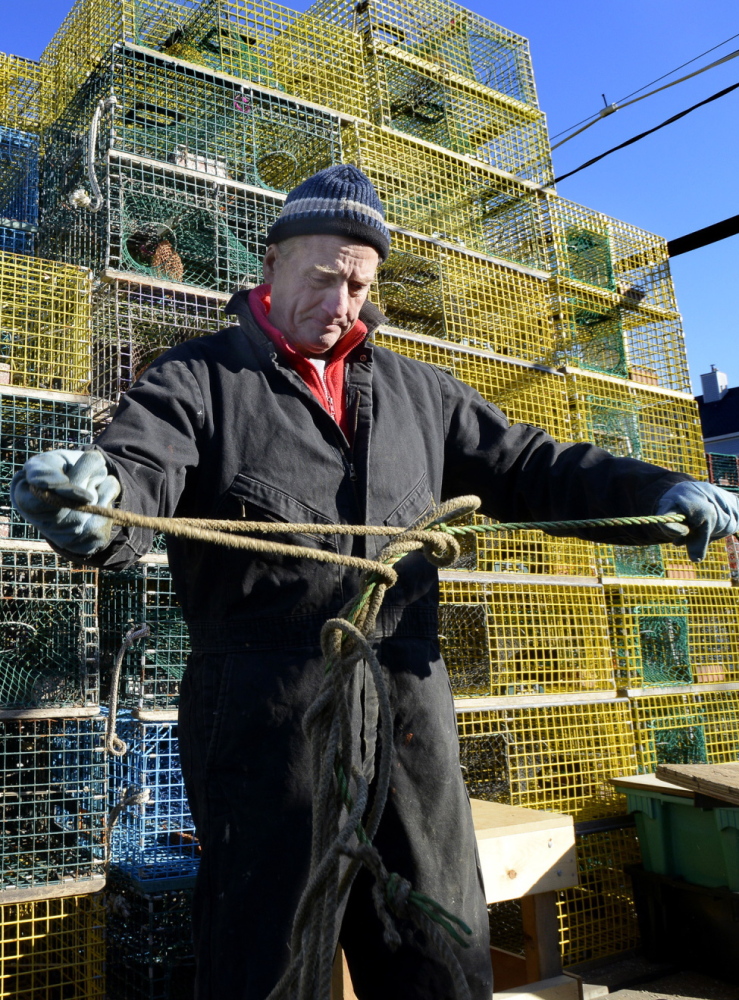ROCKLAND — Commercial fishing is a big industry in New England, but just how big may come as a surprise.
According to the latest report from the National Oceanographic and Atmospheric Association, fishing generated $12.8 billion in sales impacts in New England. American lobster landings alone amounted to $429 million, the fourth largest fishery in the country. The vast majority of that lobster was caught in Maine.
What’s more, when you factor in marine construction, tourism, shipbuilding and other related trades, more than 10 percent of all jobs in Maine are dependent on the ocean. Tens of thousands of Maine families – not to mention the small island communities in which we work – depended on the abundance of the ocean last year.
But there’s a significant, rising threat to those jobs: ocean acidification. As carbon dioxide is absorbed by the ocean – and it’s being absorbed at a faster rate than at any time in the last 300 million years – the pH of seawater goes down and the number of carbonate ions decreases. The decrease in pH makes the seawater more acidic, thus the term “acidification.”
For the past 300 million years, the ocean has had a pH of 8.2 on average. Today, it’s around 8.1. That change may sound small, but remember that the pH scale is logarithmic; that 0.1 units represents a change in acidity of 25 percent.
GULF OF MAINE MORE SUSCEPTIBLE
The decrease in pH, and associated decrease in carbonate ions, makes it extremely difficult for many organisms that form a calcium carbonate shell – including mussels, clams, oysters and lobsters – to grow or even survive. Decreases in pH can also directly affect animals’ basic bodily functions in a multitude of ways.
In Alaska, recent research on tanner crab and red king crab showed decreased survival and growth in low-pH water. Red king crab, when subjected to a pH of 7.5 for 95 days, died at a rate of 100 percent.
The damage from ocean acidification won’t happen only on the West Coast, though. In the Gulf of Maine, we’re already beginning to see negative impacts, particularly on larval scallops and clams. Further research on lobster is needed.
Worse yet, the Gulf of Maine – because of the colder, fresher water that flows in from the north, the large proportion of freshwater it gets from rivers and its semi-enclosed shape – is actually more susceptible to the effects of acidification than any of the other six regions on the Eastern seaboard recently tested by NOAA.
There is something we can do about this problem. Last month, Maine became the first state on the East Coast – with Maryland close behind – to form a panel to study the effects of ocean acidification and identify potential solutions. The panel members will be chosen by the Maine Department of Marine Resources and will include fishermen, scientists, policymakers and other stakeholders in the process.
We are glad to see the state of Maine and policymakers – especially panel sponsor Rep. Mick Devin, D-Newcastle – working to ensure that those Maine people whose jobs are at stake as a result of this problem will have a seat at the table.
FEDERAL RESOURCES NEEDED
The panel will likely identify a range of potential actions we can take at the state level to mitigate the effects of ocean acidification. But we will need more states to follow. Every coastal state in this country is at risk from ocean acidification, and each should act in its own interest by forming a similar panel and galvanizing the citizens who depend on a healthy ocean for their livelihoods.
But the ocean is too big and complicated a subject for any one state to study or manage. The federal government needs to commit resources to identifying potential solutions to acidification and options for adaptation.
Last week, U.S. Rep. Chellie Pingree, D-1st District, introduced The Coastal Communities Acidification Act (HR 4692), a bill that would require federal officials to study the effects of ocean acidification on coastal communities in Maine and around the country. A community vulnerability assessment would identify the coastal communities most at risk from ocean acidification and the most critical gaps in knowledge that must be filled.
We urge Congress – especially U.S. Rep. Mike Michaud, D-2nd District, and Sens. Susan Collins, R-Maine, and Angus King, I-Maine – to support this overdue research into the effects of ocean acidification. Hundreds of thousands of jobs and billions of dollars of economic activity – not to mention hundreds of island and coastal communities across the country – depend on it.
— Special to the Telegram
Send questions/comments to the editors.



Comments are no longer available on this story